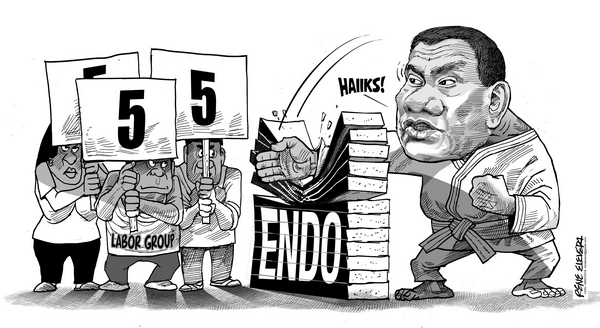
At best President Rodrigo Duterte’s Executive Order that regulates contractualization seeks to breach the middle ground between the demands of labor groups and the compromises offered by Big Business though it falls quite short of the ideal.
Under the President’s EO, contractual workers can be assured of their benefits and salaries even if they were cut off by their principal employer since the employment agency that contracted them will pay for them until they find another job.
If no one will hire them, then these former workers can secure a severance package from their employment agency which may help tide them over or fund their own livelihood.
In signing the EO, President Duterte shared the concern of past predecessors about ensuring employment for a greater number of Filipinos whose numbers in the work force had grown exponentially but not as large as those unemployed, who resort to crime or were relegated to dependency to support themselves.
While some local militant groups declared the EO an initial victory, the others were quite unsatisfied and even called for an immediate end to contractualization which is still allowed under the Labor Code.
But that’s just it. Bottom line, the President can only work through what is stated in the law and if ending contractualization is the goal, then it is up to Congress to amend the Labor Code to ban all forms of contractualization.
At the same time, the EO is a reminder to the business community to be accountable and to pay their employees what is owed to them under the law regardless of their work status.
If anything the EO is a step in the right direction and while militant labor groups demand security of tenure or none at all, it should be agreed on by both labor and employers alike that wages and benefits owed to the employees should not be compromised for the sake of keeping the business afloat.
At its core, ending contractualization means mandating the companies to hire employees directly without outsourcing them from employment agencies who are supposed to be responsible for training and paying these contractuals their wages and benefits.
That means pouring more money into both hiring and training workers, a cost that companies have avoided like a plague and which they had delegated to employment agencies in order to cut down on expenses.
As elected representatives of the people, both the President and Congress can finally end contractualization and mandate Big Business to spend more for their employees who are their most valuable resource and are their partners in earning their profits.